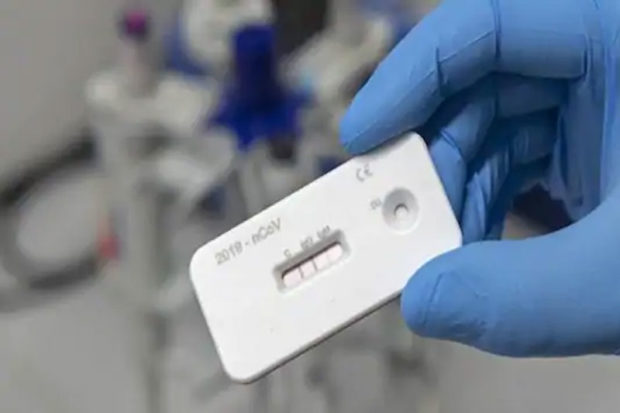
India’s Feluda COVID-19 test cheaper, faster alternative to RT-PCR, say scientists
PTI, Sep 29, 2020, 11:28 AM IST

New Delhi: More accurate than a rapid antigen test and almost as quick, India’s CRISPR ‘Feluda’ COVID-19 test that changes colour on detection of the SARS-CoV-2 virus could be a cheaper, faster and simpler alternative to an RT-PCR diagnosis, say scientists.
Named after Satyajit Ray’s famed detective, the Feluda test, which is priced at Rs 500 and can deliver a result in 45 minutes, is able to differentiate SARS-CoV-2 from other coronaviruses even if genetic variations between them are minute.
The Clustered Regularly Interspaced Short Palindromic Repeats (CRISPR) Feluda test, developed by the New Delhi-based CSIR-Institute of Genomics and Integrative Biology (IGIB) and the TATA Group, received regulatory approvals last week from the Drug Controller General of India (DCGI) for commercial launch.
It meets high quality benchmarks with 96 per cent sensitivity and 98 per cent specificity for detecting the novel coronavirus, Debojyoti Chakraborty, a senior scientist at CSIR-IGIB and part of the team that developed the test, told PTI.
Sensitivity is defined as the ability of a test to correctly identify individuals with the disease, while specificity is the ability of the assay to accurately identify those without the disease.
Similar to a pregnancy strip test, Feluda changes colour if the virus is detected and doesn’t need expensive machines for detection.
“The CRISPR technology uses a highly specific CAS9 protein to find and bind to the target COVID signature. This is then coupled with paper-strip chemistry to elicit a visual readout on a paper strip,” Chakraborty explained.
The test can help the country, with the world’s second highest cases of COVID-19 at 61.45 lakh cases, ramp up testing of the disease quickly and economically, the researchers behind the test said in a statement.
Virologist Upasana Ray noted that the CRISPR based COVID-19 detection system is a cheaper option to RT-PCR tests, which cost over Rs 1,600. RAT and Feluda are in the same price bracket.
FELUDA, an acronym for the FNCAS9 Editor-Limited Uniform Detection Assay, uses an indigenously developed, cutting-edge CRISPR technology for detection of the genomic sequence of SARS-CoV-2 virus, the scientists said.
CRISPR is a gene editing technology and is used in correcting genetic defects and treating and preventing the spread of diseases.
The technology can detect specific sequences of DNA within a gene, and uses an enzyme functioning as molecular scissors to snip it.
According to Ray, Feluda is capable of detecting even low quantities of the genetic material of the novel coronavirus, based on very minute differences in their RNA – the genetic material of a virus
“Feluda is an alternative to the quantitative RT-PCR tests and is highly specific. It is capable of detecting low copy number nucleic acids (less viral RNA quantity) as well as single nucleotide variations,” Ray, a senior scientist at CSIR-IICB, Kolkata, told PTI.
She explained that the tests are so specific that they can distinguish SARS-CoV-2 infections from other coronaviruses such as the one that caused the 2002-03 SARS pandemic.
“It can distinguish between SARS-CoV-2 and SARS-CoV sequences which differ by a single nucleotide. Unlike RT-PCR which requires expensive machines, Feluda is simple and can be used in laboratories as well as outside with a quicker turnaround time,” she added.
In May, the US granted emergency-use approval for the world’s first CRISPR-based test for COVID-19, developed by the Massachusetts Institute of Technology (MIT) and Harvard University.
The CRISPR Feluda test is the world’s first diagnostic test to deploy a specially adapted Cas9 protein, derived from Francisella novicida bacteria, to successfully detect the virus that causes COVID-19, the researchers said.
Other CRISPR tests, like the one developed in the US, use CAS12 and CAS13 proteins to detect SARS-CoV-2.
Compared with a rapid antigen test, which interprets results in 30 minutes, Ray said the Feluda test would take slightly longer, up to 45 minutes, but is more accurate and specific.
Rapid antigen tests detect the viral proteins or parts thereof whereas CRISPR detects nucleic acids, or RNA in case of COVID-19, Ray said.
Chakaraborty noted that RT-PCR takes about 1.5 hours, trained manpower and a dedicated and expensive RT-PCR machine which is not widely available.
“Feluda gives similar sensitivity and specificity as RT-PCR but is inexpensive, requires a basic widely available PCR machine and doesn’t require extensive trained manpower. The chemistry and biology is of course different,” Chakraborty added.
“This marks a significant achievement for the Indian scientific community, moving from R&D to a high-accuracy, scalable and reliable test in less than 100 days. The Tata CRISPR test achieves accuracy levels of traditional RT-PCR tests, with quicker turnaround time, less expensive equipment, and better ease of use,” the researchers said in their statement.
They described CRISPR as a futuristic technology that can also be configured for the detection of other pathogens.
“Current R&D is towards making Feluda more point of care, simpler and more deployable to meet the testing needs of the country and enable return to workplaces, schools, etc,” Chakraborty added.
Udayavani is now on Telegram. Click here to join our channel and stay updated with the latest news.
Top News

Related Articles More

ISRO to study how crops grow in space on PSLV-C60 mission

ISRO & ESA agree to cooperate on astronaut training, mission implementation

Snatcher lands in police net in Delhi, AI tech helps reveal identity

AI Meets Health: The Rise of Smart Fitness Solutions

Power Up by Powering Down: 10 Energy-Saving Tips for Every Home
MUST WATCH
Latest Additions

Kalaburagi: Woman sustains burns after live electric wire falls on her

Nelamangala accident: Police expedite probe, CCTV images being scrutinised

Rohan Estate Mukka – Resort-style luxury layout launched

Minister Parameshwara directs police to ensure tight security in Bengaluru on New Year’s eve

Teachings of Lord Christ celebrate love, harmony: PM Modi at Christmas celebrations
Thanks for visiting Udayavani
You seem to have an Ad Blocker on.
To continue reading, please turn it off or whitelist Udayavani.


















